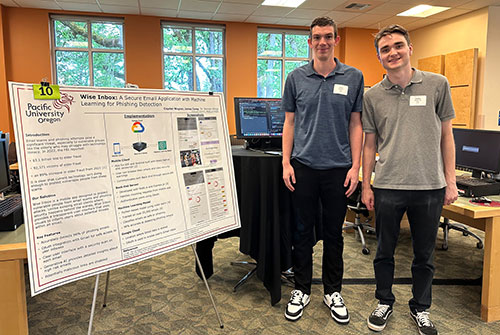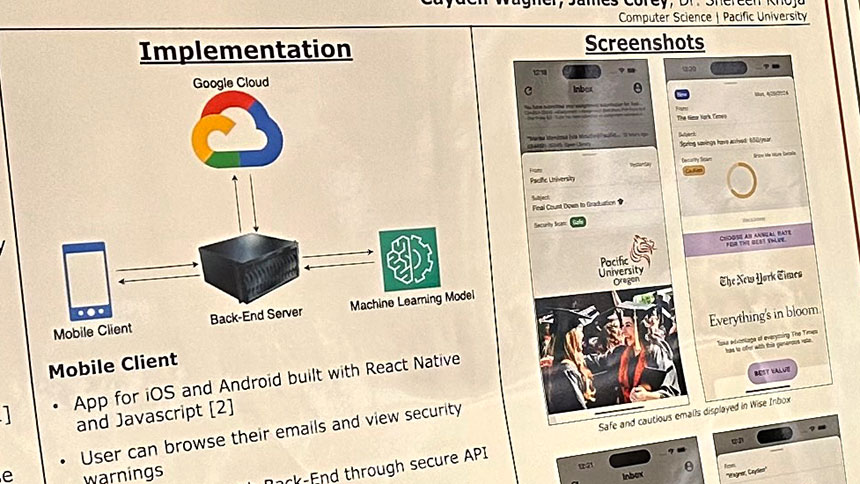Wise Inbox: Experiential Learning In Mobile App Development
 Cayden Wagner ’24 spends a lot of time helping his grandparents determine whether an email is legitimate or a scam.
Cayden Wagner ’24 spends a lot of time helping his grandparents determine whether an email is legitimate or a scam.
“They will screenshot an email when they’re unsure of how to proceed with it and send it to our family group chat,” the Pacific University alum said. “They ask, ‘Is this really a company emailing me? Is someone trying to scam me?’”
For most email platforms, the process of sorting through legitimate emails and scams, phishing emails and bad actors happens before those messages ever hit the inbox. Wagner believes that leaves end users more vulnerable, especially for seniors and anyone who is not tech-savvy.
“The user is completely unaware that anything is happening,” said Wagner, who now works as a user interface programmer for Netflix in the Bay Area. “I think it makes things really vulnerable because they expect that these malicious emails are never going to reach their inbox when in reality they do from time to time.”
That desire for transparency in the process inspired Wagner and his research partner, James Corey ’24, both computer science majors, to focus their senior capstone at Pacific on developing a mobile application to guide email users through what is a safe message and what could be malicious. The project, an example of the experiential learning opportunities available at Pacific, also helped Wagner land a job out of college with one of the world’s top streaming providers.
Wagner and Corey spent their senior year developing Wise Inbox, an app designed to make the user part of the vetting process. The app was designed to scan emails and provide guidance on how to deal with a questionable message. Wise Inbox provides an added layer of protection to automated processes used by email providers such as Gmail.
“The application knows how to handle messages and guides users through a step-by-step process,” Wagner said. “Should they delete the email? Should they ignore it? Should they block the sender? The app guides them through how to handle a malicious email in their inbox so that they’re more equipped and less vulnerable when they are browsing.”
Wagner and Corey were inspired not only by the experience of their grandparents but also by the statistics on email scams. Their capstone presentation referenced FBI statistics showing that seniors lost $3.1 billion in fraudulent schemes in 2022. A recent study by the Federal Trade Commission reports that the number of Americans age 60 and older who lose more than $100,000 to fraud has tripled since 2020.
 In testing leading up to their presentation, Wise Inbox proved 96% effective in predicting safe and malicious emails. The app was tested against 25,000 safe and phishing emails, culled from multiple public datasets, and provided color-coded insights (red for an unsafe email, yellow for a questionable email, green for a safe email) that gave users options on how to handle a message.
In testing leading up to their presentation, Wise Inbox proved 96% effective in predicting safe and malicious emails. The app was tested against 25,000 safe and phishing emails, culled from multiple public datasets, and provided color-coded insights (red for an unsafe email, yellow for a questionable email, green for a safe email) that gave users options on how to handle a message.
The development of Wise Inbox was a significant milestone in a journey where Pacific helped Wagner hone in on his professional purpose. Originally from southeast Portland, Wagner was attracted to Pacific by the computer science, math and data science programs, and the opportunity to play college basketball.
By the summer of his junior year, however, an internship with a Portland-area tech startup, specializing in mobile app development, convinced him to put his full focus on computer science.
“I really loved my internship and they offered to extend me through the fall,” Wagner said. “So I ended up stepping away from basketball and diving into computer science. I’m glad I did because I think I like computer science more than basketball.”
That passion, along with the work on his capstone, helped land Wagner at Netflix soon after graduation. He is part of a team working with the service’s user interfaces, implementing features and evaluating the effectiveness of the platform’s login screens and user platforms.
With Wagner and Corey’s graduation came the end of the Wise Inbox project. To see an app like that through to release takes months of testing and resources that simply weren’t in place for an undergraduate capstone. But the project set Wagner up with the skills needed to succeed in today’s tech world.
“I learned a lot of cooperation skills. I learned how to divvy up work and how to delegate tasks to somebody else, and how to plan a project over the course of six or seven months,” Wagner said. “I learned a lot about mobile app development and backend application development. Those skills directly translated in the first few days of my career. I felt more prepared to start my career because of those skills I learned at Pacific.”


